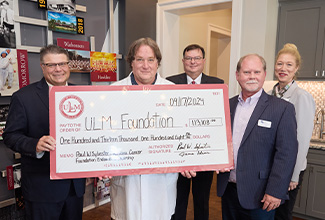


The Pharmacy program at ULM is Louisiana’s only publicly supported comprehensive center for pharmaceutical education, research, and service. The education offered at ULM equips our students with the tools necessary to be prepared for and be successful in the constantly changing field of health care. Graduates of our pharmacy program work across the nation in community and health-system pharmacies, clinical practices, managed care groups, academia, the pharmaceutical industry, and a wide variety of other settings.
Students enrolled in the pharmacy program at ULM receive a challenging and forward-thinking education that combines classroom learning, practical application, and experiential training in our state-of-the-art pharmacy facility located in Monroe, Louisiana. We invite you to take some time to explore the information here.
Making sure your program is the right financial investment is an important part of the search process.
COST & FINANCINGThe College of Pharmacy at ULM is Louisiana's only publicly supported comprehensive center for pharmaceutical education, research, and service.
Our faculty conduct extensive research in the areas of breast cancer, prostate cancer, diabetes, lung disease, inflammatory arthritis and drug delivery. Faculty have had numerous patents awarded to their research and are able to obtain over a million dollars annually in grant funding. Clinical faculty practice in many specialized areas of pharmacy practice including Ambulatory Care, Cardiology, Oncology, Infectious Diseases, Pediatrics and Emergency Medicine.
Our students have the option of earning a Master of Business Administration while earning a Doctor of Pharmacy degree, as well as working toward a PhD while pursuing the PharmD. They may also work towards a Master of Healthcare Informatics with the PharmD through a shared program with Louisiana Tech.
• The ULM College of Pharmacy’s main campus is housed in a secure facility where only designated individuals can enter.
• Caring and approachable faculty and staff.
• Students have 24-hour building access, providing safe and quiet study areas.
• State-of-the-art labs and mock pharmacy
• Team-based learning with inter-professional activities that allow students to work as a team with other healthcare disciplines
• State of the art multi-media active learning classroom.
• Two distant campuses in New Orleans and Shreveport housing clinical faculty.
• Unique electives and educational experiences:
– Medical mission trip to provide medical care in under-served countries such as Honduras and the Dominican Republic
– Each year a group of students are selected to attend the weeklong APhA Institute on Substance Use Disorders in Utah
– Skills and knowledge are further enhanced through a wide variety of practice experience opportunities during the last two years of the Pharm.D. program
• Annual career fairs
• Interview training and residency preparatory opportunities
• Networking activities held throughout the year
Clinic Pharmacy Practice
In many clinics that serve diverse segments of the US population, pharmacists are integral members of the health care team whose contributions have been shown to optimize patient outcomes while being cost effective.
Community Pharmacy
Community pharmacists are often on the first line of health care. In addition to dispensing medications and monitoring patients for adverse effects and interacting drugs, pharmacists provide important counseling services, such as the proper selection of over-the counter medications and/or referral to other health care providers.
Geriatric Pharmacy
Thirty-seven percent of the U.S. population are mature adults who likely consume more than half of all health care resources.
Governmental Agencies
Local, state and federal governmental agencies such as the National Institutes of Health, the Food and Drug Administration, the Veterans Administration and the Armed Forces require the expertise of skilled pharmacists.
Home Health Care
Patients formerly treated in a hospital setting are now receiving professional care in their residences through home health care.
Hospital Pharmacy
Many graduates pursue careers in hospital pharmacy where they are directly involved in patient care.
Managed Care
Broadly stated, managed care is planned, comprehensive and integrated provision of health care in a cost-effective manner that emphasizes preventive care.
Pharmacy
The University of Louisiana at Monroe College of Pharmacy offers a four-year Doctor of Pharmacy (PharmD) degree. To be eligible to apply to our program, applicants must complete approximately two to three years of undergraduate pre-pharmacy courses (a minimum of 67 semester credit hours), which can be taken at any accredited college or university. Upon admission to the professional program, students begin three years of classroom, laboratory, and practice instruction at ULM, followed by one year of experiential rotations at locations around the state in which students train in a variety of practice settings.
Ph.D.
The Doctor of Philosophy degree in Pharmacy is awarded by the Graduate School through the School of Pharmacy. Students must select a major specialization from among the areas of Medicinal Chemistry, Pharmaceutics, Pharmacology, and Toxicology.
Graduate studies in medicinal chemistry involve applying the knowledge of chemistry to research associated with therapeutically useful compounds. This research includes the design and synthesis of new classes of therapeutic agents, the chemical modifications of existing drugs leading to an improved therapeutic effect, the correlation of the chemical structure of a drug with its pharmacological activity, the development and improvement of techniques used in the analysis of therapeutic agents, and the study of how chemical properties affect drug distribution and metabolism
Medicinal Chemistry Required Courses
Research in pharmaceutics involves all aspects of design, development, and evaluation of effective dosage forms/delivery systems, and entails one or more interdisciplinary areas that include physical pharmacy, pharmaceutical analysis, drug delivery, biopharmaceutics, and pharmacokinetics.
Pharmaceutics Required Courses
Pharmacology is the study of the effects of chemicals on living systems and may include the study of individual molecules and cells, tissues or whole organisms. The _eld of pharmacology occupies a central position in the continuum of biomedical sciences such that there are often unclear boundaries between pharmacology and, for example, the _elds of toxicology, biochemistry, physiology, pathology and microbiology.
Dual Degree Pharm.D. / MBA
Because of a growing need for pharmacy profession leaders to be proficient in both the practice of pharmacy and knowledgeable in the business of pharmacy, the ULM College of Pharmacy and the ULM College of Business and Social Sciences offer a dual degree program for the professional pharmacy student to graduate with both the Doctor of Pharmacy (PharmD) degree and the Master of Business Administration (MBA) degree. In addition to completing the curriculum of the PharmD program, the dual degree student will also complete the curriculum of the Pharmacy concentration of the MBA degree.
At the College of Pharmacy, your education extends beyond the classroom.
College advisers can help you choose from a range of opportunities that complement your coursework and put your pharmaceutical knowledge into practice.
Pharmacy Alumni Liaisons (PALs)
American Pharmacists Association - Academy of Student Pharmacists (APhA-ASP)
Christian Pharmacists Fellowship International (CPFI)
Kappa Epsilon (KE)
Louisiana Society of Health-System Pharmacists (LSHP)
National Community Pharmacists Assc. (NCPA)/Louisiana Independent Pharmacies Assc. (LIPA)
Phi Delta Chi (PDC)
Phi Lambda Sigma (PLS)
Learn more about financial aid options: https://www.ulm.edu/financialaid/
Learn more about scholarship opportunities: https://www.ulm.edu/scholarships/



